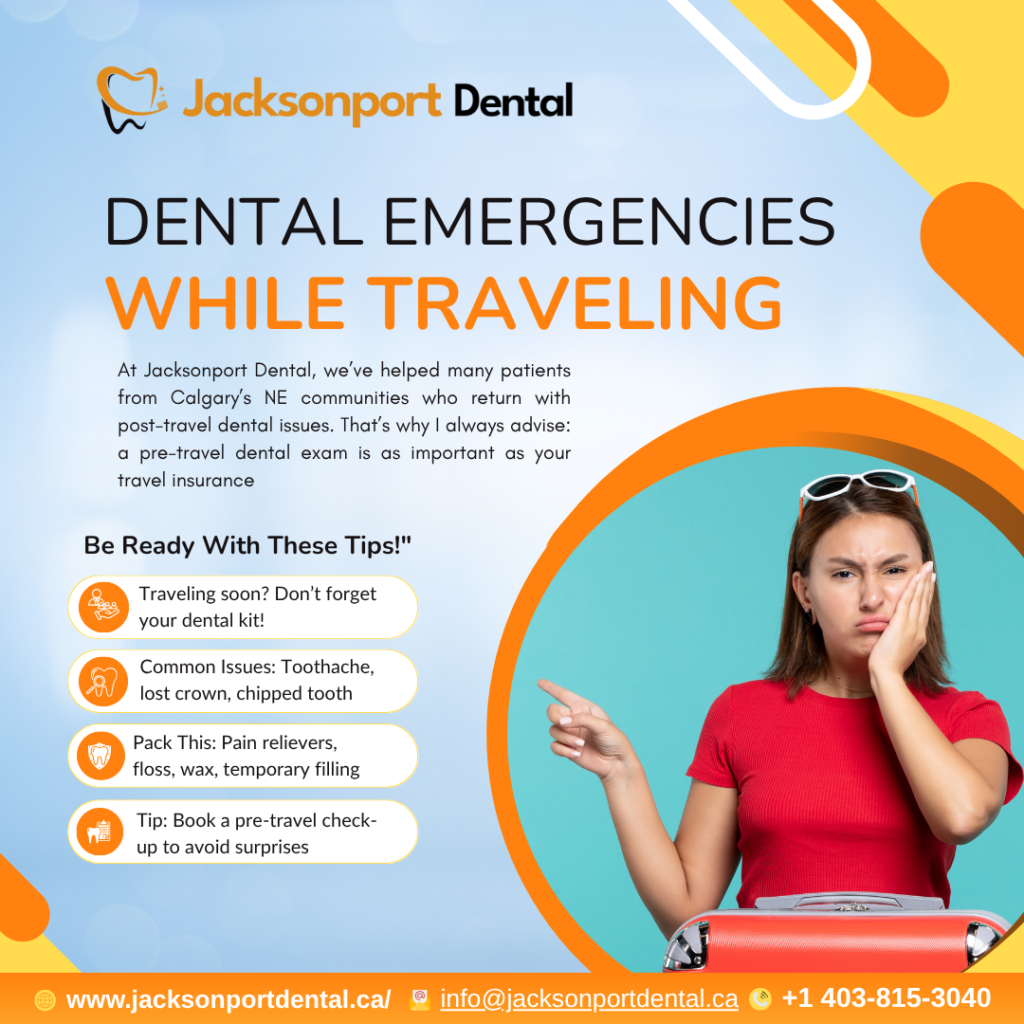Advice from Dr. Richa Bhatnagar at Jacksonport Dental Clinic, Calgary
When you plan a vacation or business trip, you probably think about what clothes to pack, not whether your filling might fall out in the middle of a new city.
Yet, dental emergencies during travel are surprisingly common. As a family and general dentist serving Calgary’s northeast communities, I often meet patients who’ve experienced unexpected dental issues while on the road—sometimes even mid-flight!
In this blog, I’ll guide you through the types of dental emergencies, how to prepare, what to do if something goes wrong, and how to follow up when you return to Calgary.
What Is Considered a Dental Emergency?
A dental emergency is any issue involving the teeth, gums, or jaw that causes pain, discomfort, bleeding, or swelling—and requires immediate attention to prevent further damage.
Here are the most common dental emergencies that can occur while traveling:
- Severe toothache or sudden sensitivity: This could indicate deep decay, nerve involvement, or even a developing abscess.
- Cracked, chipped, or broken tooth: Often caused by accidental biting, trauma, or chewing hard foods.
- Lost fillings, crowns, or veneers: These leave your tooth exposed and at risk of infection.
- Infections and swelling: Especially dangerous if accompanied by fever or facial swelling—may indicate an abscess that needs urgent drainage.
- Gum injuries or soft tissue lacerations: Can result from sports injuries, accidental falls, or aggressive brushing.
- Broken dentures or retainers (including Invisalign): Can affect speech, chewing, and appearance—especially important during longer trips.
- Jaw pain, TMJ issues, or ear-like pain: Often triggered by stress, poor posture during travel, or long flights.
How to Prepare Before You Travel
1. Schedule a Pre-Travel Dental Checkup
Book a routine checkup at least 1–2 weeks before your departure. At Jacksonport Dental Clinic, we recommend a quick examination to rule out any early signs of tooth decay, loose restorations, gum infections, or impacted wisdom teeth.
A small issue now can turn into a full-blown emergency mid-vacation—especially if you’re traveling to a remote area or abroad.
👉 Looking for a Calgary dentist near Cityscape, Redstone, or Skyview Ranch? Schedule your pre-travel exam today!
2. Pack a Dental Travel Kit
A little preparation goes a long way. Here’s what to include:
- Over-the-counter dental pain relievers (e.g., ibuprofen or acetaminophen)
- Temporary dental filling kit (available at pharmacies like Shoppers Drug Mart or Amazon)
- Orthodontic wax to cover sharp edges from broken teeth or braces
- Floss and antiseptic mouthwash
- Travel-size fluoride toothpaste (especially for sensitive teeth)
- Gauze pads or cotton balls for bleeding
- A copy of your dental records or recent X-rays (especially for complex cases or ongoing treatments like implants or Invisalign)
What to Do if a Dental Emergency Happens While Traveling
Here’s a breakdown of the most common emergencies and how to handle them effectively:
Toothache
- Rinse with warm saltwater to reduce bacteria.
- Floss gently to remove trapped debris.
- Apply a cold compress to your cheek if swelling is present.
- Take pain relievers, avoiding aspirin directly on the gums.
- Avoid chewing on the affected side until seen by a dentist.
Note: Persistent toothache could signal an abscess, which may spread quickly and become life-threatening if ignored.
Chipped or Broken Tooth
- Rinse your mouth and the broken fragment with warm water.
- If bleeding, apply gentle pressure with gauze.
- Cover the sharp edge with orthodontic wax to protect your tongue or cheek.
- Store the broken piece in milk or saline (not water) and see a dentist ASAP.
Lost Crown or Filling
- Clean the area thoroughly.
- If you still have the crown, temporarily reattach it using over-the-counter dental cement.
- Avoid hard or sticky foods.
- Get the tooth permanently restored as soon as possible to avoid infection or nerve exposure.
Facial Swelling or Abscess
- Swelling, especially with pain and fever, is a red flag.
- Rinse with saltwater and take anti-inflammatory medication.
- Seek immediate dental or medical attention—especially if you notice difficulty breathing or swallowing.
Broken Dentures or Aligners
- Do not use glue—it’s toxic and unsafe for oral use.
- Keep the pieces clean and store them in a case.
- Visit a local dental clinic that offers emergency prosthodontic services.
- For Invisalign patients: bring extra trays if possible while traveling.
How to Find a Dentist During Travel
Inside Canada
Use Google Maps or provincial dental association directories. Search for:
- “emergency dentist near me”
- “walk-in dental clinic Calgary / Toronto / Vancouver” (depending on your location)
Outside Canada
- Check your travel insurance for dental coverage.
- Ask your hotel concierge for a referral.
Always verify credentials and reviews when choosing an unfamiliar provider.
When to Contact Jacksonport Dental Clinic From Afar
We may not physically be there, but we’re just a call or email away.
If you’re a current patient and unsure about a dental issue while away, email us info@jacksonportdental.ca a photo or X-ray (if taken locally) and we’ll advise whether it can wait or needs urgent attention.
Clinic Info:
Jacksonport Dental Clinic
📍 124-3730 104 Ave NE, Calgary AB T3N 0T1
📞 403-815-3040
📧 info@jacksonportdental.ca
What to Do When You Return to Calgary
Even if you received treatment abroad, schedule a follow-up visit with your local Calgary dentist to ensure everything has healed correctly.
We’ll:
- Check for residual infection
- Replace any temporary fillings or crowns with permanent restorations
- Assess any bite or alignment issues
- Provide professional cleaning if needed
Final Tips for a Worry-Free Smile While Traveling
- Always bring your dental insurance card (Canadian or travel policy)
- Store your dentist’s contact info in your phone
- Stay hydrated and avoid too many sugary vacation treats
- Be cautious with street food and very hard or chewy items
- For longer travel, consider travel-specific dental insurance
Closing Thoughts from Dr. Richa
Traveling is one of life’s great joys—and your dental health should never stand in the way of that. With a little planning and some know-how, you can prevent or manage most emergencies and still enjoy your time away.
At Jacksonport Dental Clinic, we’re here for Calgary families before and after every adventure. Whether you’re traveling to Toronto, Vancouver, Mexico, or the mountains, you deserve peace of mind knowing your dental care team is just one call away.



